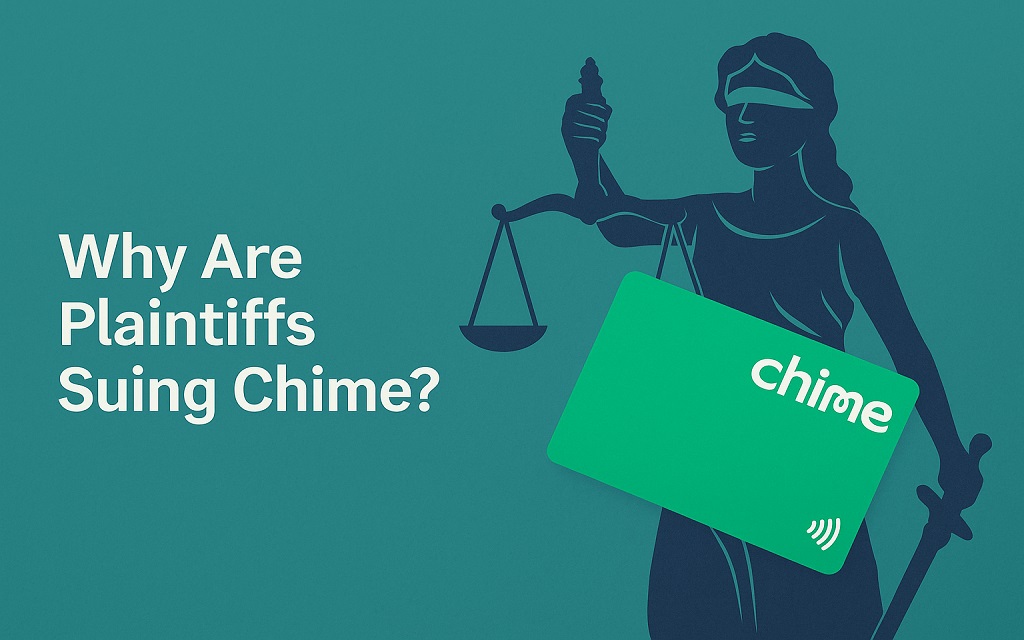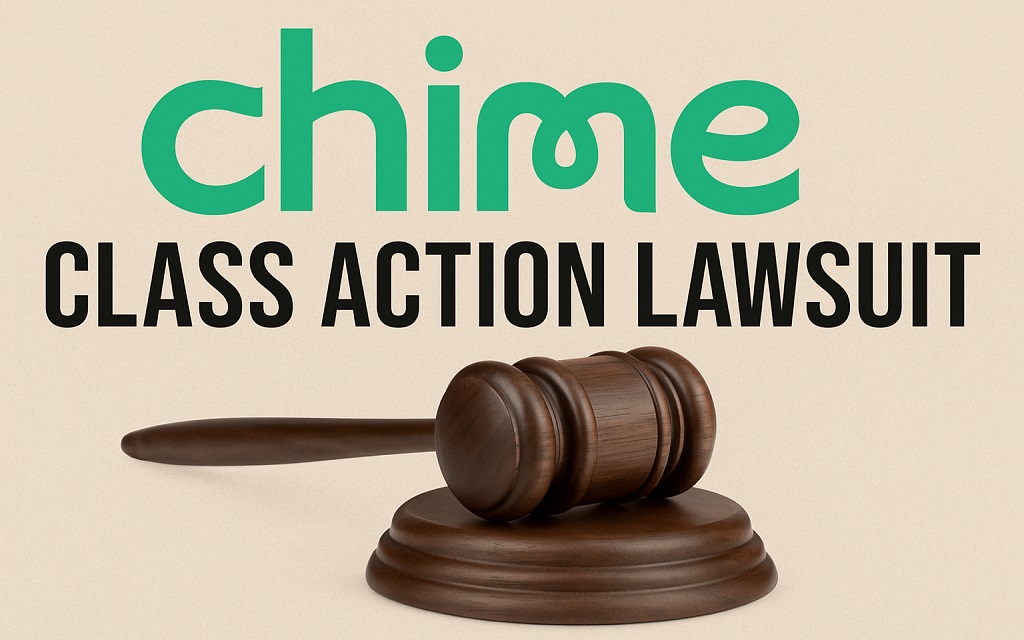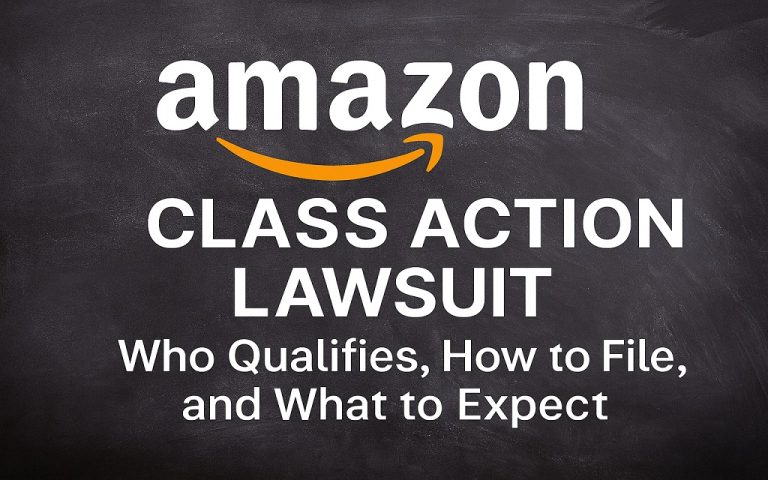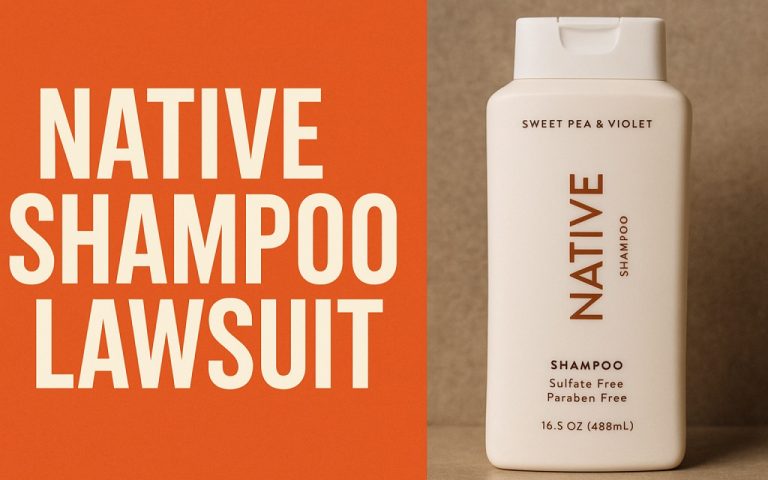The Chime class action lawsuit 2025 is gaining national attention after claims that the neobank sent unsolicited referral texts without user consent. The Washington Commercial Electronic Mail Act (CEMA), one of the most robust anti-spam statutes in the US, may have been broken by these mailings, according to attorneys.
The case could have significant financial implications. Each message could lead to $500 or more in statutory damages under CEMA. Past spam text lawsuits have resulted in multi-million-dollar settlements, and consumers nationwide are now watching to see their Chime class action lawsuit 2025 payout per person if they qualify for compensation. This article explains the allegations, the legal process, potential Chime settlement details, and payout options for affected users.
What Is the Chime Class Action Lawsuit About?
The Chime Financial Text Message Class Action under investigation centers on allegations that Chime Financial, Inc. sent unsolicited referral texts promoting new account signups. Plaintiffs claim these messages were sent without prior consent, violating Washington’s Commercial Electronic Mail Act (CEMA) — a law that bans commercial electronic messages sent without permission.
Under CEMA, recipients may seek $500 in damages per message, with the possibility of higher awards for intentional violations. The plaintiffs contend that automated referral texts used in Chime’s marketing campaigns were sent to those who had never opted in or interacted with the company before.
Legal experts note that these charges reflect the heightened scrutiny of neobank marketing practices, as digital banking platforms increasingly use promotional and referral texts to attract clients. If proven true, the assertions might establish a benchmark for consent-based marketing strategies used by US fintech companies.
Why Is Chime Being Sued by Plaintiffs?

Chime Financial allegedly issued referral SMS without permission, in violation of the Washington Commercial Electronic Mail Act (CEMA), according to the plaintiffs. These messages reportedly promoted Chime account signups and included referral links tied to existing customers.
Several consumers report receiving these unsolicited Chime text messages, even though they never interacted with Chime. Some say the company used referral programs that accessed user contacts or shared codes in ways that breached CEMA’s consent requirements.
CEMA applies to all unsolicited commercial texts sent to Washington residents. If the sender does business in Washington, it can also cover recipients who are out of state. $500 in statutory damages may be imposed for each unauthorized message, and more severe penalties may be imposed for deliberate infractions.
In some cases, individuals received multiple messages within a short time. If a person got three referral texts, that could equal $1,500 in damages before attorney fees or punitive awards. Because these damages can add up across thousands of users, the case has drawn national attention.
Attorneys argue that the Chime class action lawsuit shows a pattern of aggressive marketing similar to other fintech promotions that triggered prior lawsuits. The results could reshape how online banks handle referral systems and text message class action lawsuit risks in the future.
What is the Commercial Electronic Mail Act of Washington?
One of the most stringent anti-spam regulations in the US is the Washington Commercial Electronic Mail Act (CEMA). Customers are shielded from unsolicited email and text marketing. The law makes it illegal for businesses to send commercial electronic messages without first getting permission from the recipient.
CEMA allows $500 in statutory damages per unlawful message. If a company acts intentionally or ignores complaints, courts can increase that amount. CEMA encompasses all forms of electronic marketing, such as text messages, referral links, and app-based advertising, unlike federal rules that only target robocalls.
Although they are frequently used interchangeably, the Telephone Consumer Protection Act (TCPA) and CEMA are not the same thing. The TCPA covers automated or prepared calls and texts. CEMA focuses on unsolicited commercial messages that promote products or services. However, when both laws are broken, there might be large payouts.
Past CEMA cases show how severe the penalties can be. In one enforcement action, a company agreed to pay over $6 million for sending thousands of unwanted messages. That precedent gives weight to the current Chime class action lawsuit 2025, where damages could reach millions if courts find similar violations.
The law’s purpose is clear. CEMA ensures that consumers remain in control of who can contact them and how their personal data is used in marketing campaigns.
How Much Money Could Affected Users Receive?
The Washington Commercial Electronic Mail Act (CEMA) sets a minimum of $500 per unlawful text message. Consumers do not need to prove actual financial harm to recover damages. Courts can increase the amount up to $1,500 per message if the violation appears intentional or repeated.
Several factors affect the payout amount. Judges review how many messages were sent, whether Chime ignored earlier complaints, and how the referral system operated. Each text counts as a separate violation, which means the total could grow quickly in a class action case.
For example, if 10,000 people each received three referral texts, the Chime class action lawsuit 2025 payout per person could push total damages toward $15 million before attorney fees or settlement adjustments. Courts often use these numbers to calculate potential exposure during negotiations.
CEMA lawsuits tend to settle before trial because the financial risk is high. Companies usually prefer settlements over public verdicts that could set stricter precedents. Past text message class action lawsuits under similar laws have ended with multi-million-dollar payouts to affected users.
Consumers who received multiple unsolicited Chime text messages could qualify for statutory damages even if they did not lose money directly. That makes CEMA one of the most powerful tools for digital privacy enforcement in Washington.
Has Chime faced Similar Charges before?
In recent years, Chime Financial has encountered several legal issues. Account freezes, postponed deposits, and consumer protection infractions were the subject of earlier litigation. Those cases focused on customer access to funds rather than spam or referral texts.
The new Chime Financial Text Message Class Action investigation marks the first time Chime faces claims under the Washington Commercial Electronic Mail Act (CEMA). Plaintiffs say the company’s referral system relied on automated text marketing that violated the law. This has drawn renewed attention from regulators and consumer attorneys across the country.
Legal commentators point out that financial businesses frequently come under fire for their advertising strategies. Digital banks have previously received warnings from the Consumer Financial Protection Bureau (CFPB) about employing pushy customer acquisition strategies. Chime’s case fits that pattern.
Other fintech firms have faced similar claims. After sending unsanctioned promotional texts, another internet bank agreed to pay $2 million in 2021. That outcome could influence how courts and lawyers handle the Chime settlement investigation.
Even if the allegations are settled, a company’s reputation may suffer from ongoing legal troubles. Chime’s compliance with consumer protection laws has been put to the test in many lawsuits, including this one. The outcomes may influence the company’s future marketing and communication initiatives.
How Should You Respond to a Chime Spam Text?
Anyone who received an unsolicited Chime text message without consent can take several necessary steps. Save a screenshot of the message first. Add the time, date, and sender information. If you submit a claim or join a lawsuit, this information may be vital proof.
Save copies of your cell phone bill from the time the texts came in. If you asked Chime to stop sending messages, document that as well. Multiple messages after an opt-out request can strengthen a claim under Washington’s Commercial Electronic Mail Act (CEMA).
Avoid deleting any follow-up texts. Attorneys often use message history to prove that the sender ignored complaints or failed to honor consent rules.
Next, get in touch with a law firm that specializes in litigation involving spam texts. Many take on TCPA and CEMA claims on a contingency fee basis, which means you don’t have to pay for legal services unless they get paid. When you consult with a lawyer, please provide them with all of your communication logs so they can determine whether your case is suitable for a class action lawsuit.
Tracking persistent infractions can also be facilitated by reporting the text to the Federal Trade Commission (FTC) or state consumer protection organizations. Every report strengthens the evidence that digital banks must comply with anti-spam laws. Also, state agencies help build the overall record for reviewing the Chime settlement details.
Preserving documentation early often makes the difference between a rejected claim and a thriving settlement.
How Does the Process of Class Actions Operate?
Numerous customers with related claims might consolidate their cases into a single class action lawsuit. Lawyers will initially submit a complaint outlining the central claims and impacted users if the Chime class action proceeds. After that, the court will determine if the case satisfies the prerequisites for class certification.
A vital first step is certification. It permits one or more plaintiffs to speak on behalf of every other affected user. Following certification, the discovery process starts, during which attorneys trade records, correspondence, and documents about the referral texts.
Attorneys may examine Chime’s internal marketing data, opt-in procedures, and referral campaign tactics during discovery. They may also take depositions from company executives or marketing staff to establish intent.
Negotiations usually take place throughout the case. Many text message class action lawsuits settle before trial because settlements reduce costs and legal risks for both sides. A Chime settlement agreement must still receive court approval before payments can go out to class members. If a trial becomes necessary, the court will decide whether Chime violated Washington’s Commercial Electronic Mail Act (CEMA) and determine the appropriate damages.
Class members are typically notified through email, text, or website postings once a settlement is approved. Each person must then file a claim form to receive their share of the payout. The process can take months or even years, depending on how quickly the court moves through each stage.
What Are the Possible Outcomes?
A Chime class action lawsuit could end in several ways. A court-approved settlement, in which Chime agrees to compensate impacted consumers without acknowledging guilt, is the most typical result. A trial verdict is an additional option that can work in the plaintiffs’ or the company’s advantage. If there is not enough evidence, a judge may rarely dismiss the case.
The majority of CEMA cases are resolved out of court. Through settlements, businesses can still pay claimants while avoiding drawn-out legal disputes and bad press. For instance, a tech corporation in 2019 consented to pay $8.5 million under a comparable law without acknowledging any misconduct.
The court may grant statutory damages of up to $1,500 per message for deliberate violations in the Chime case if it goes to trial. The number of texts sent and the court’s interpretation of the company’s aim will determine the overall amount.
Challenging a trial verdict can sometimes cause final payments to be postponed for months or even years. Lawyers keep negotiating possible settlements during this time.
Whatever the verdict, this case may influence future neobank practices on digital marketing and referral schemes. A sizable settlement or stringent decision might lead to revisions in industry-wide regulations to stop similar infractions.
What Is the Difference Between CEMA and Federal Laws Like the TCPA?
Although they address separate topics, the Telephone Consumer Protection Act (TCPA) and the Washington Commercial Electronic Mail Act (CEMA) both shield customers from unsolicited mailings. The TCPA governs autodialed calls and text messages, whereas CEMA targets unsolicited commercial electronic messages.
CEMA applies mainly to Washington residents or companies that operate in the state. TCPA applies nationwide and covers robocalls, prerecorded messages, and automatic text systems. Both laws can lead to significant penalties when businesses ignore consent requirements.
In many lawsuits, attorneys include both CEMA and TCPA claims. This approach increases potential recovery and adds pressure during settlement negotiations. Each TCPA violation can result in $500 to $1,500 in damages, similar to CEMA’s statutory range.
Lawyers examine how messages were sent, what technology was used, and whether recipients provided consent. If a company used automated systems without permission, both statutes might apply.
In the Chime class action lawsuit 2025, CEMA appears to be the primary focus because the allegations involve unsolicited referral texts sent to promote new accounts. However, if there is proof that automated distribution methods or telemarketing systems were used, lawyers may include TCPA charges.
Knowing the differences between the TCPA and CEMA makes it easier to decide which law provides impacted users with greater compensation and better consumer protection.
How Could This Case Affect Chime Users Nationwide?
The outcome of the Chime class action lawsuit could reach beyond Washington. A huge payment or court decision might compel Chime Financial to alter its marketing strategies nationwide, even if the class solely consists of people who live in Washington.
Neobanks rely primarily on online recommendations to draw in new clients. A legal setback might force Chime and related businesses to implement new verification procedures or more stringent consent practices. For instance, another major bank implemented a double opt-in procedure before sending promotional messages following a sizable settlement over spam texts in 2020.
Other financial companies would also be cautioned by a CEMA verdict against Chime, which mandates that explicit opt-in processes be followed when engaging in text-based referral campaigns or unwanted text message marketing. In response, regulators such as the Consumer Financial Protection Bureau (CFPB) may increase their monitoring of digital marketing in the financial industry.
Broader compliance procedures could also help users outside of Washington. Stronger privacy controls, clearer consent requests, and improved account communication may follow if Chime adjusts its referral systems. The Chime settlement details could serve as a blueprint for future cases involving text message class action lawsuits.
The case could set a national precedent for how financial technology companies use automated or third-party platforms to contact potential customers. If the court awards substantial damages, other firms may rethink their marketing strategies to avoid similar lawsuits.
FAQs
How do I get a Chime settlement?
File a claim once the Chime settlement is approved. Follow instructions on the official settlement website.
Is there a Chime lawsuit?
Yes. A Chime class action lawsuit is under investigation for unsolicited referral texts sent without permission.
How much is the payout per person?
Estimates for the Chime class action lawsuit 2025 payout per person depend on message count and court rulings. Each message may bring $500 or more.
Is Chime under investigation?
Yes. Chime faces scrutiny for marketing practices linked to the Chime Financial Text Message Class Action.
Is Chime safe in 2025?
Yes. Chime remains FDIC-insured, but legal actions may lead to updated communication policies.
Conclusion
The Chime class action lawsuit could affect thousands of users across the United States. Each unsolicited referral text may qualify for statutory damages under the Washington Commercial Electronic Mail Act (CEMA). The law allows at least $500 per message, and that amount can rise for intentional violations.
Consumers who received a Chime promotional message should consider speaking with an attorney. Legal professionals can review each case, confirm eligibility, and secure your share of any Chime settlement payout.
A final court ruling or settlement could lead to changes in how neobanks handle digital marketing and referral systems. Chime’s case highlights how vital consumer consent has become in the financial technology industry.
Staying informed about court updates and settlement announcements helps users protect their rights and Chime settlement details.
Disclaimer: This article provides a general overview of the Chime class action lawsuit, based on publicly available information, and is intended for informational purposes only. It is not legal advice.
Musarat Bano is a content writer for JudicialOcean.com who covers lawsuits, legal news, and general legal topics. Her work focuses on research-based, informational content developed from publicly available sources and is intended to support public awareness. She does not provide legal advice or professional legal services.




